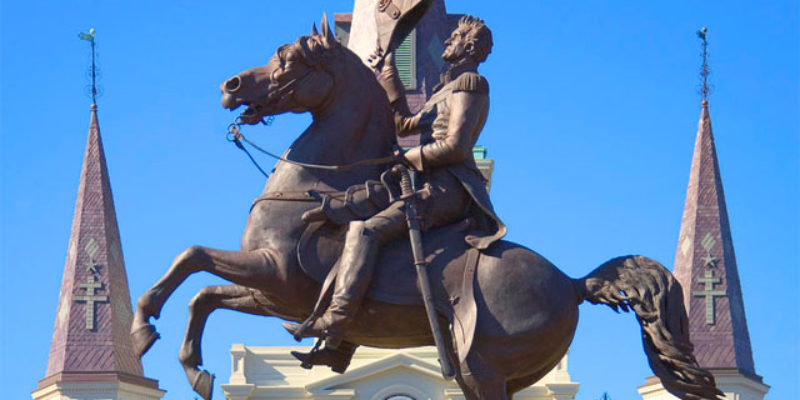The most important figure in American history between George Washington and Abraham Lincoln is Andrew Jackson.
Jackson was a consequential man on the battlefield and later in the White House.
Jackson transformed the presidency and American democracy. Jackson is the founder of the modern Democratic Party (he was the second “J” in his party’s annual J-J Dinner that was a staple event). His political rise parked a greater level of participation in the political process by the masses.
For example, when Jackson first ran for president in 1824, 365,928 ballots were cast for president. When Jackson ran a second time to avenge his defeat in the previous election, which had been controversially decided by the US House of Representatives, the number of ballots swelled to 1,149,216.
And Jackson managed to forestall two secession crises: indirectly ending the threat by New England states to leave the Union over the War of 1812 by winning the Battle of New Orleans and as president defusing the Nullification Crisis, which could have led to a federal intervention in South Carolina over the tariff issue.
Rather than debate who’s the more worthy person to be pictured on the twenty dollar bill or why Washington bureaucrats are even engaging in such petty actions at the tail-end of a presidential administration or why the sudden jump from replacing Hamilton to replacing Jackson (actually that can be answered cogently: Hamilton the musical), I think it’s more important at this juncture to raise awareness about the lifelong service of Old Hickory.
Few families have sacrificed as much for what would become the United States as Jackson’s.
Along with his two brothers, the future president served his country during the Revolutionary War at the age of thirteen. In addition to being one of America’s youngest war veterans, he also has the distinction of being one of our country’s youngest POWs, as while serving as a courier for the rebels the young Jackson was captured by the British.
Jackson almost didn’t survive the harsh conditions he endured during his captivity. Jackson’s older brother Robert ended up perishing shortly after release, having contracted smallpox during his confinement. Andrew’s oldest brother Hugh had died from heat exhaustion during an earlier battle.
Jackson’s mother Elizabeth contracted cholera while nursing colonial POWs and died just two months after the Battle of Yorktown had effectively secured American independence.
And then there was the engagement that changed America and that would launch him to the presidency. Jackson commanded the most diverse fighting force to ever serve under the Stars and Stripes: backwoodsmen from Tennessee and Kentucky, local militia whose native tongue was either French or Spanish; free men of colour, many being exiles from Haiti; Choctaw warriors; and the celebrated Baratarian privateers who turned down a generous British bribe and joined forces with the same federal government that had destroyed their base of operations and imprisoned Jean Lafitte’s brother.
Facing this armed gumbo of humanity was the very army that had captured and burned the nation’s capital and had routed Napoleon’s soldiers across Portugal and Spain.
That Jackson not only won the battle but had inflicted such a disproportionate number of casualties against what was considered the finest fighting force in the world shocked Great Britain and instilled confidence in the young nation, drawing the disparate states into a stronger union.
While the Treaty of Ghent had been signed between the two belligerents two weeks prior to the battle, the capture of New Orleans by the British compounded with the previous occupation of Washington would have scarred the national psyche, likely leading to the consensual breakup of the country.
Instead, the capture of Washington and the burning of the White House and US Capitol is largely forgotten while the War of 1812 was considered the Second War of American Independence, with January 8th honored as a national holiday.
It should also be mentioned that Jackson insisted that the free men of colour serving at the line were paid the same amount as their white counterparts. Sociologists should be celebrating such progressive policies by Jackson, but such facts run counter to the Leftist narrative that Jackson was more war criminal than war hero.
That Jackson is being removed from currency a year after the bicentennial of the Battle of New Orleans shows exactly how indifferent the American political bureaucracy is to our national story.
Thus a bona fide national hero is jettisoned by a callous ungrateful nation.
Advertisement
Advertisement

